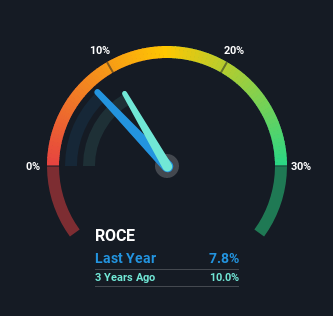- United Kingdom
- /
- Trade Distributors
- /
- LSE:GFTU
Returns On Capital At Grafton Group (LON:GFTU) Have Hit The Brakes

There are a few key trends to look for if we want to identify the next multi-bagger. Amongst other things, we'll want to see two things; firstly, a growing return on capital employed (ROCE) and secondly, an expansion in the company's amount of capital employed. Basically this means that a company has profitable initiatives that it can continue to reinvest in, which is a trait of a compounding machine. However, after investigating Grafton Group (LON:GFTU), we don't think it's current trends fit the mold of a multi-bagger.
Understanding Return On Capital Employed (ROCE)
For those that aren't sure what ROCE is, it measures the amount of pre-tax profits a company can generate from the capital employed in its business. To calculate this metric for Grafton Group, this is the formula:
Return on Capital Employed = Earnings Before Interest and Tax (EBIT) ÷ (Total Assets - Current Liabilities)
0.078 = UK£183m ÷ (UK£3.0b - UK£635m) (Based on the trailing twelve months to December 2020).
Therefore, Grafton Group has an ROCE of 7.8%. In absolute terms, that's a low return and it also under-performs the Trade Distributors industry average of 13%.
Check out our latest analysis for Grafton Group

In the above chart we have measured Grafton Group's prior ROCE against its prior performance, but the future is arguably more important. If you'd like to see what analysts are forecasting going forward, you should check out our free report for Grafton Group.
What The Trend Of ROCE Can Tell Us
In terms of Grafton Group's historical ROCE trend, it doesn't exactly demand attention. The company has consistently earned 7.8% for the last five years, and the capital employed within the business has risen 70% in that time. Given the company has increased the amount of capital employed, it appears the investments that have been made simply don't provide a high return on capital.
The Bottom Line On Grafton Group's ROCE
In summary, Grafton Group has simply been reinvesting capital and generating the same low rate of return as before. Since the stock has gained an impressive 99% over the last five years, investors must think there's better things to come. Ultimately, if the underlying trends persist, we wouldn't hold our breath on it being a multi-bagger going forward.
On a separate note, we've found 1 warning sign for Grafton Group you'll probably want to know about.
While Grafton Group may not currently earn the highest returns, we've compiled a list of companies that currently earn more than 25% return on equity. Check out this free list here.
If you’re looking to trade Grafton Group, open an account with the lowest-cost* platform trusted by professionals, Interactive Brokers. Their clients from over 200 countries and territories trade stocks, options, futures, forex, bonds and funds worldwide from a single integrated account. Promoted
New: Manage All Your Stock Portfolios in One Place
We've created the ultimate portfolio companion for stock investors, and it's free.
• Connect an unlimited number of Portfolios and see your total in one currency
• Be alerted to new Warning Signs or Risks via email or mobile
• Track the Fair Value of your stocks
This article by Simply Wall St is general in nature. It does not constitute a recommendation to buy or sell any stock, and does not take account of your objectives, or your financial situation. We aim to bring you long-term focused analysis driven by fundamental data. Note that our analysis may not factor in the latest price-sensitive company announcements or qualitative material. Simply Wall St has no position in any stocks mentioned.
*Interactive Brokers Rated Lowest Cost Broker by StockBrokers.com Annual Online Review 2020
Have feedback on this article? Concerned about the content? Get in touch with us directly. Alternatively, email editorial-team (at) simplywallst.com.
About LSE:GFTU
Grafton Group
Engages in the distribution, retailing, and manufacturing businesses in Ireland, the Netherlands, Finland, and the United Kingdom.
Very undervalued with flawless balance sheet and pays a dividend.

